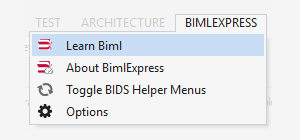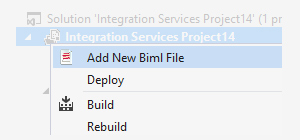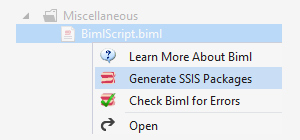
Biml
A programming language for creating and automating data solutions.
Biml Examples
Biml uses XML and small nuggets of C# or VB code to automatically create huge amounts of SQL scripts, SSIS packages, SSAS cubes, tabular models, and more.
The following examples demonstrate a simple staging solution for any source system - in under 50 lines of code.
Getting Started with Biml
1. Install BimlExpress.

Download BimlExpress, our free Visual Studio add-in. When you restart VS, you'll see a new BimlExpress menu.
2. Create your first Biml file.

Right-click on your project in the solution explorer to create a new Biml file in your SSIS project.
3. Paste in some code and build.

Copy/paste one of the code samples above into your Biml file, save, and then right-click on the file in the solution explorer and select "Generate SSIS Packages".
Advanced Features

Staging Environment from Source
Reduce time spent on projects by turning repetitive work into reusable scripts. Maintain control over your framework.

Import and Modify Packages
Leverage Microsoft SQL Server technologies (SSIS and SSAS) with no custom runtimes.

Increased productivity
Eliminate time dealing with corrupted metadata in SSIS. The Biml engine allows you to add a column to a table and it.

Automated Development
Reduce time spent on projects by turning repetitive work into reusable scripts. Maintain control over your framework.

SQL Server Compatibility
Leverage Microsoft SQL Server technologies (SSIS and SSAS) with no custom runtimes. Compiled solutions are immediately.

Increased productivity
Eliminate time dealing with corrupted metadata in SSIS. The Biml engine allows you to add a column to a table and it automatically.



